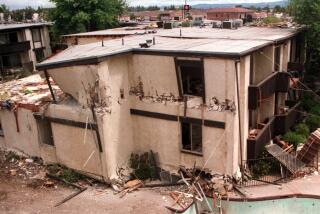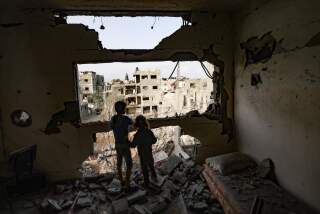A Son Writes Home From Saudi Arabia : Military: Paratrooper Robbie Muir, in his second campaign at age 20, tries to tell his parents not to worry. But between the lines, ‘it was like he was saying goodby.’
- Share via
FULLERTON — This is the house where Robbie grew up, a comfy earth-tone home at the end of a cul-de-sac. Robbie’s dog, Cody, trots into the dining room, tongue dragging from the heat.
The family parrot, B.J., squawks his name every other minute, as though Robbie, always popular with the girls, is still home: “Robbie! Telephone, Robbie!”
For the record:
12:00 a.m. Sept. 5, 1990 For the Record
Los Angeles Times Wednesday September 5, 1990 Orange County Edition Metro Part B Page 2 Column 6 Metro Desk 1 inches; 17 words Type of Material: Correction
Paratrooper--A story last Thursday about Army Pfc. Robert Muir misidentified his enlistment date. It was Nov. 1, 1988.
But Robbie Muir, 20, is stationed in Saudi Arabia. And he is, as his father puts it, “the line in the sand that President Bush has drawn. My son.”
As a member of the Army’s 82nd Airborne based at Fort Bragg, N.C., Robbie’s unit is somewhere in the desert--likened by a fellow soldier to living in “a microwave.” Robbie offered no date for his arrival in Saudi Arabia but his first letter, dated Aug. 10, suggested he had been in the vortex of the Persian Gulf conflict since the start.
“He said we might not hear from him for awhile,” said his father, Ronnie Muir.
His parents say the tone of his voice, the sound of his last letter that arrived home Tuesday, make two things clear: He has graduated from innocent teen-ager into a man, and he is, in his own way, prepared to die.
In his last call home, his father recalled tearfully, “He said, ‘Dad, I love ya, I’m OK, tell Mom I love her. And if I’ve ever done anything wrong to hurt ya I’m sorry.’ It was like he was saying goodby.”
As the American presence in the Mideast continues to grow, the Muirs have fallen into a routine to get through the tumultuous days of uncertainty. While overseeing the operation of their Norwalk A & W restaurant, the couple soaks up television news broadcasts, scanning the screen for their son. And they pray. They also are members of an Orange County support group of families of military in Saudi Arabia, which will meet again this Saturday night.
Ronnie and Dee Muir and their 23-year-old daughter, Tamara, share a bond with thousands of other American families of servicemen and women overcome by both patriotic pride and gripping anxiety that their loved ones may not come home.
The prospect of chemical warfare heightens their alarm.
On Tuesday they received their second letter from Robbie, a four-page chronicle of courage, renewed faith in God, fear about surviving Iraq’s deadly chemical weapons, loneliness and humor.
Seated in their family room Tuesday, the Muirs cried over the words, especially the parts where their son expressed love for God and them--two areas that have always been difficult for a young man who is bright but headstrong and was “rambunctious” during his years at Whittier Christian High School in La Habra.
“Dear Mom and Dad and Tammy, Well, I really don’t know where to start so much has happened to me in the last two weeks. . . . Here I sit in the totally hot desert of Saudi Arabia with no money, no soap or washer and dryer or anything!” They chuckle.
“They are training us for chemical attacks every day. This chemical crap really sucks man! . . . We carry shots to give ourselves if we get it. But the other stuff we’re told just keep fighting, cause in one or two hours you’re gonna die. That’s hard to face I tell ya! But of course I signed the dotted line.” The Muirs fight tears.
”. . . This place is wild! I came here expecting to see camels and tents and Ali Baba-type of people running around. But believe it or not the average man is a very wealthy person. They still wear sheets and that pillow case thing on their head, but they live in huge houses and drive Mercedes and BMWs. And get this, about the only cool thing here is they can each have up to four wives. Cool, huh?” More laughs.
He wrote about how funny he looked attending church services “armed to the teeth” with a grenade launcher, a “huge knife” and “full combat gear.”
“I sure do miss everyone. I want to go to the (family) ranch and chase Cody in that golf cart. And I want to have a root beer float. I miss the small things already. I know what I have to do though, do just what I did in Panama: put everything on pause and go inside myself again. I really hate doing that though cause it changes a person bad. If you knew how hard it is to be away from everything you have known and loved, then do this kind of crap. You would lose it mentally.”
“I need to shut up, I’m starting to whine, and soldiers can’t whine.”
This is the really tough stuff, his parents said, and it’s not the first time they’ve been through it.
Pfc. Muir was among the commando units in Panama when the United States invaded to oust Gen. Manuel Noriega.
He sent home photographs from that mission, photographs that pictured him and other paratroopers riding jeep-like vehicles with their arms draped over their machine guns, tarp-covered bodies of the enemy, a dazzling rainbow rising over the devastated Panama City, his friends grinning from behind a desk in one of Noriega’s offices.
After the fighting began, Robbie and his buddies wired together a phone so that he could call home. The conversation was brief, and his father gets teary at the thought.
“It was like he’d tasted, or he’d seen, something that changed him, matured him, and definitely quieted him,” Dee Muir said.
The parents, both 43, showed off pictures of their son, marveling at the changes in him since he enlisted in the 82nd Airborne on July 1, 1988. In one photograph he’s at his best friend’s wedding wearing a tuxedo, his arm around his beloved sister, both strikingly attractive blue-eyed, sandy-haired blonds. Another shows him in a Panamanian jungle, toting a gun, avocado-colored war paint covering his steely face.
It is hard, Dee Muir said, to know your son has become a man in a foreign land.
“As a mother,” she said, “it kills me that I can’t put my arms around him and tell him it’s going to be OK. Knowing he’s out there in the desert, the heat, the loneliness, in some foxhole.”
“As a father,” Ronnie Muir says, “your daughter is the pride and joy of your life, and I wear her heart on my sleeve,” he says. “But your son, it’s hard to describe. He’s like you. he is you in many ways.”
More to Read
Sign up for Essential California
The most important California stories and recommendations in your inbox every morning.
You may occasionally receive promotional content from the Los Angeles Times.













